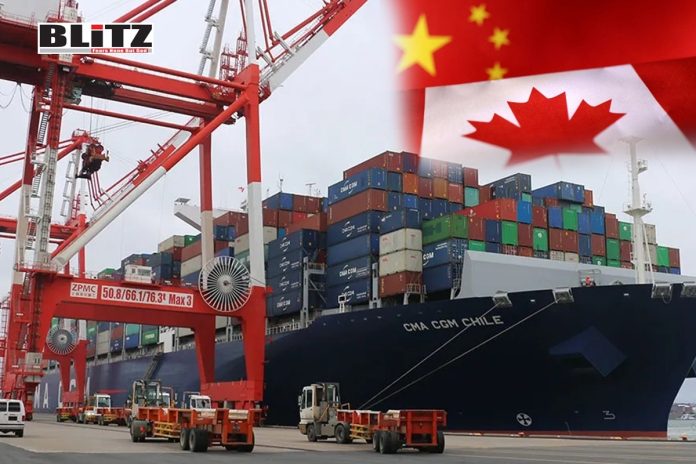Within the intricate dance of worldwide relations, Canada typically finds itself in alignment with the USA, notably in relation to issues regarding China. Nevertheless, current developments point out that such alignment could come at a value, not solely straining financial relations with China but in addition endangering Canada’s personal financial pursuits.
A current revelation by Canadian media outlet The Globe and Mail make clear a regarding growth: the Canadian authorities, in collaboration with the Vancouver Fraser Port Authority, is evaluating the potential nationwide safety dangers posed by China-built cargo cranes working in Canadian ports. This announcement intently follows reviews of the US planning to switch China-built cranes, citing related safety issues.
The crux of the problem lies in allegations that Chinese language cranes comprise communication gadgets, elevating specters of espionage and safety breaches. Nevertheless, a cursory understanding of crane mechanics would reveal the absurdity of such claims. Chinese language-made cranes have gained international acclaim for his or her effectivity and reliability, with Shanghai Zhenhua Heavy Industries Co. (ZPMC) alone servicing over 70 p.c of the world’s automated terminals.
Regardless of ample proof supporting their high quality and effectiveness, politicians in each the US and Canada appear inclined to parrot narratives highlighting nationwide safety dangers, revealing a regarding deficiency in impartial judgment. This political maneuvering seems to be motivated extra by loyalty to US insurance policies relatively than real apprehensions about safety. Such alignment raises questions in regards to the autonomy of decision-making and the extent to which nationwide pursuits could also be subordinated to geopolitical alliances.
The tendency to align intently with the USA shouldn’t be a current development. For years, particular Canadian politicians have exacerbated tensions with China, emphasizing perceived threats with out totally evaluating the potential penalties for Canada’s economic system. In an period marked by international uncertainty, such uncritical adherence to US directives seems poorly suited and missing foresight.
The financial ties between China and Canada are intricately intertwined, characterised by mutual advantages and complementarity. China holds the place of Canada’s second-largest buying and selling accomplice, with bilateral commerce volumes reaching substantial ranges lately. Disrupting this very important financial relationship wouldn’t solely be lamentable however would additionally end in vital financial losses for Canada, underscoring the significance of sustaining secure and constructive diplomatic and commerce relations with China.
Furthermore, Canada’s utilization of Chinese language cranes is grounded in market dynamics, the place high quality and competitiveness reign supreme. Any makes an attempt to switch Chinese language cranes, mirroring US actions, would undoubtedly end in losses for Canada. The US’s personal experiences with related protectionist measures, spanning industries from photo voltaic panels to semiconductors, function cautionary tales of financial stagnation and inflated prices.
The folly of favoring home industries over market rules turns into obvious amidst growing financial losses and rising inflation. Canada can’t afford to repeat these errors, particularly because it negotiates a precarious equilibrium between its financial imperatives and political affiliations. It should heed the teachings of previous errors, recognizing that sacrificing market effectivity for protectionist measures finally undermines long-term financial stability and jeopardizes its capacity to successfully navigate the complexities of world commerce and diplomacy.
A extra pragmatic strategy to financial and commerce cooperation with China is crucial. Respect for market guidelines and a departure from the American playbook are vital steps if Canada needs to safeguard its financial prosperity. As the worldwide panorama evolves, Canada should chart its personal course, guided by rationality relatively than blind adherence to exterior pressures.
The narrative surrounding China-built cranes highlights the dangers of aligning with US insurance policies with out adequately assessing Canada’s pursuits. It serves as a stark reminder for Canadian policymakers to prioritize financial pragmatism over mere political gestures. Canada should embrace impartial decision-making and acknowledge the significance of market dynamics to safeguard its financial future amidst the evolving international panorama. By doing so, Canada can navigate uncertainties with confidence and guarantee its prosperity in an ever-changing world.


